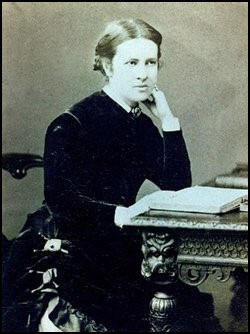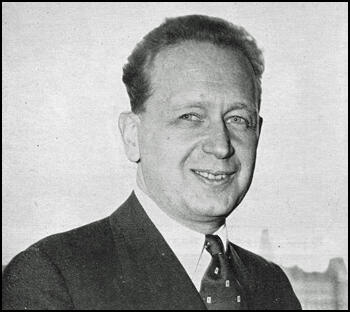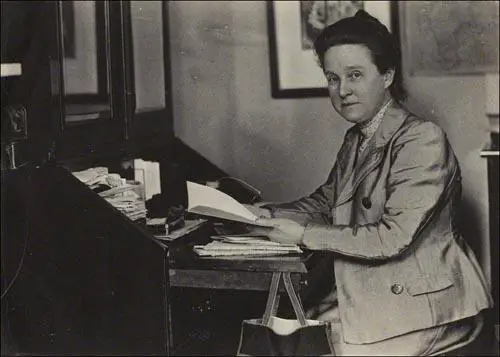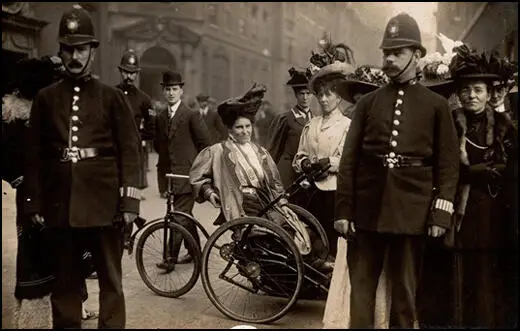On this day on 29th July
On this day in 1863, Elizabeth Garrett application to study at Aberdeen Hospital is rejected. "I must decline to give you instruction in Anatomy… I have a strong conviction that the entrance of ladies into dissecting-rooms and anatomical theatres is undesirable in every respect, and highly unbecoming… it is not necessary for fair ladies should be brought into contact with such foul scenes… Ladies would make bad doctors at the best, and they do so many things excellently that I for one should be sorry to see them trying to do this one."

On this day in 1905 Dag Hammarskjöld, the son of Hjalmar Hammarskjold, prime minister of Sweden, was born on 29th July, 1905. He studied at Uppsala University where he took a degree in the humanities. A talented linguist he spoke several languages including English, French and German. He took further degrees in economics (1928) and law (1930) and taught in 1933 began teaching at the University of Stockholm.
Hammarskjold worked on the Royal Commission on Unemployment. This was followed by the post of undersecretary in the Ministry of Finance (1936-1945) where he ran the Swedish Price Control Board. After the war Hammarskjold became head of the Risbank. While in this post he drafted the legislation that introduced the Welfare State in Sweden. It was during this period he was credited with being the first to use the term the "planned economy".
Although he was not a member of any political party, Hammarskjold joined the government and served in the foreign ministry. He favoured international economic cooperation and played an important role in the development of the Council of Europe and the Organization of European Economic Cooperation. He was also involved in the implementation of the Marshall Plan. However, he strongly resisted pressure for Sweden to join the North Atlantic Treaty Organization (NATO).
In 1949 Hammarskjold represented Sweden as a delegate to the United Nations and in 1953 was elected Secretary General of the organization. I this post he was involved in negotiating the release of American soldiers captured by the Chinese in the Korean War. Hammarskjold refused to submit to McCarthyism and rejected the idea put forward by John Foster Dulles that the Federal Bureau of Investigation should investigate the staff of the UN.
He was also involved in what he called "preventive diplomacy". This included attempts to solve the disputes in Palestine, Vietnam and Egypt. During the Suez Canal Crisis Hammarskjold managed to persuade the United Nations Security Council to condemn the actions of Israel, France and Britain.
In July 1960 Hammarskjold became involved in attempting to solve the civil war in the Congo. He arranged for a UN peace-keeping force to be sent to the region but in September 1961 fighting erupted between Katanga troops and the noncombatant forces of the UN. In an effort to secure a cease-fire he arranged to meet President Moise Tshombe. On 17th September 1961 Dag Hammarskjold was killed when his plane crashed close to Ndola airport. Hammarskjold's journal, Markings, was published in 1963.

On this day in 1913, Millicent Fawcett writes to Herbert Asquith about women's suffrage "on behalf of the immense meetings which assembled in Hyde Park on Saturday and voted with practical unanimity in favour of a Government measure." Asquith replied that the demonstration had "a special claim" on his consideration and stood "upon another footing from similar demands proceeding from other quarters where a different method and spirit is predominant." A meeting was held and afterwards commented that she felt that there had been "a notable improvement in his attitude and language".

On this day in 1953 suffragette May Billinghurst died in Weybridge. .
Rosa May Billinghurst was born in Lewisham on 31st May 1875. Her father, Henry Billinghurst, was a banker. Her mother, Rosa Brinsmead, was the daughter of a wealthy piano manufacturer. A healthy child at birth but when she was five months old, she suffered an illness which left her whole body paralysed, and although she regained the use of her hands and arms she would never walk unaided.
The Billinghurst family paid for a governess to provide her with a good basic education. However, her disability made it impossible for her to go to university. Her sister, Alice Billinghurst, was a superintendent at a local children's home, arranged for her to do voluntary work for the Greenwich and Deptford Union Workhouse. She was shocked by what she saw and later recalled: "My heart ached and I thought surely if women were consulted in the management of the state happier and better conditions must exist for hard-working sweated lives such as these."
May Billinghurst became interested in politics and the subject of women's suffrage. She later recalled: "My heart ached and I thought surely if women were consulted in the management of the state happier and better conditions must exist for hard-working sweated lives such as these... It was gradually unfolded to me that the unequal laws which made women appear interior to men were the main cause of these evils. I found that the man-made laws of marriage, parentage and divorce placed women in every way in a condition of slavery - and were as harmful to men by giving them power to be tyrants."
She attended meetings where she heard Millicent Fawcett, Charlotte Despard and Emmeline Pankhurst give speeches. However, it was Christabel Pankhurst who inspired her to become a suffragette: "I wondered how the public could ever be made to think about it. In the midst of the hopelessness of it all Christabel Pankhurst sounded the war note of militancy and was imprisoned for her boldness, and the subject of votes for women was on every tongue." May joined the Women's Social and Political Union (WSPU) in October 1907. Over the next few months her family donated a considerable sum of money to the organisation.
Billinghurst also left the Liberal Party in protest to the way they had dealt with the issue of women's suffrage. She wrote to the Manchester Guardian where she argued: "I feel that the present government is not acting in accordance with the first principles of Liberalism, by refusing the right of representation to women taxpayers. I have joined no other party and I still claim to be a Liberal woman but a Liberal woman on strike."
In July 1910 Billinghurst she became the secretary of the Greenwich branch of the WSPU. In November Billinghurst was one of 159 women arrested at a demonstration outside the House of Commons. Afterwards she recalled: "At first the police threw me out of the machine on to the ground in a very brutal manner. Secondly when on the machine again they tried to push me along with my arms twisted behind me in a very painful position. Thirdly they took me down a side road and left me in the middle of a hooligan crowd, first taking all the valves out of the wheels and pocketing them so that I could not move the machine."
Another suffragette later testified: "Her crutches were lodged on each side of her self-propelling invalid chair and when a meeting was being broken up or an arrest being made she would charge the aggressors at a rate of knots that carried all before her. When the police retaliated and tried to control this she ran the risk of being ejected on to the ground, where she was quite helpless. Of course she took the risk with her eyes open and when this happened, as it did on occasion, made full and unscrupulous use of her infirmities so as to obtain the maximum publicity for the cause."
Fran Abrams the author of Freedom's Cause: Lives of the Suffragettes (2003) argues that May Billinghurst became an important figure in the WSPU campaign: "May Billinghurst was no fool. She knew full well, and so did the leaders of the WSPU, that her hand-propelled invalid tricycle gave her a special advantage in the propaganda battle they were waging. It made it difficult, if not impossible, for the media to portray May as a howling harridan with little care for the safety of others. At its least effective the sight of her at a demonstration was a picturesque one, commented on lightly along with other aspects of the pageantry of the day. At best, it served to underline in bold the brutal tactics of the police and the vulnerability of the suffragette demonstrators."
In November 1911, May Billinghurst was arrested again. Henry Nevinson reported: "Just at that time as I was returning to Whitehall I met Miss Billinghurst, that indomitable cripple, being carried shoulder high by four policemen in her little tricycle or wheel-cart that she propels with her arms. Amid immense cheering from the crowd she followed the rest into the police station."
One newspaper claimed that she had "set her chair going at full tilt towards the police". May Billinghurst was charged with obstruction and sentenced to five days' imprisonment or a five shilling fine. Someone must have paid the fine because there is no record of her having gone to Holloway Prison on this occasion.
In March 1912 the WSPU organised a new campaign that involved the large-scale smashing of shop-windows. May agreed to hide some of the stones underneath the rug covering her knees. According to Votes for Women: "From in front, behind, from every side it came - a hammering, crashing, splintering sound unheard in the annals of shopping... At the windows excited crowds collected, shouting, gesticulating. At the centre of each crowd stood a woman, pale, calm and silent."
May Billinghurst was arrested and was eventually sentenced to one month's hard labour. She spent the time in Holloway Prison although the authorities found that the "hard labour" part impossible to enforce. A fellow prisoner, Alice Ker, a doctor from Liverpool, wrote to her daughter on 7th April: "Miss Billinghurst, the tricycle lady, is going out on the 11th and will take this (letter). She is quite lame, wears irons on her legs and walks with crutches when she is out of her tricycle. We shall miss her very much when she goes out."
On her release she took part in the campaign to destroy the contents of pillar-boxes. By December 1912, the government claimed that over 5,000 letters had been damaged by the WSPU. A fellow suffragette, Lilian Lenton, argued: "She (May Billinghurst) would set out in her chair with many little packages from which, when they were turned upside down, there flowed a dark brown sticky fluid, concealed under the rug which covered her legs. She went undeviatingly from one pillar box to another, sometimes alone, sometimes with another suffragette to do the actual job, dropping a package into each one."
May Billinghurst was eventually arrested at Blackheath preparing for a pillar-box raid. She seemed pleased about being caught as she told the police officer: "With all the pillar boxes we've done, there has been nothing in the papers about it - perhaps now there has been an arrest there will be something." May appeared at the Old Bailey in January 1913.
During the trial Billinghurst argued: "The government authorities may further maim my body by the torture of forcible feeding as they are torturing weak women in prison at the present time. They may even kill me in the process for I am not strong, but they cannot take away my freedom of spirit or my determination to fight this good fight to the end."
Billinghurst was found guilty and sentenced to eight months in Holloway Prison. The judge remarked: "No one could, I think, doubt for a moment - as mistaken as I think you to be - that you were animated by the highest and purest motives in what you did... you do not belong to the class of hysterical women, many of whom are associated with this movement, who appear to be animated mainly or at any rate in some measure by a desire for notoriety." Emmeline Pankhurst wrote from Paris: "I cannot tell you how deeply I feel your splendid courage and endurance. All my heart will be with you during the ordeal that lies before you."
May Billinghurst immediately went on hunger-strike: "I just laid on my back and endured it all - on Sunday I was very weak and on Sunday night I tried to get out to the bell because my head was swimming round so I fell on the floor and fainted... My head was forced back and a tube jammed down my nose. It was the most awful torture. I groaned with pain and I coughed and gulped the tube up and would not let it pass down my throat. Then they tried the other nostril and they found that was smaller still and slightly deformed, l suppose from constant hay-fever. The new doctor said it was impossible to get the tube down that one so they jammed it down again through the other and I wondered if the pain was as bad as child-birth. I just had strength and will enough to vomit it up again and I could see tears in the wardresses' eyes."
After protests about her treatment by George Lansbury and Keir Hardie in the House of Commons, and comments from the prison doctor, who feared she would die of a heart-attack, she was released on 18th January, 1913. While May was living at home her mother received an anonymous letter: "Do not allow your daughter to go out in the neighbourhood of Blackheath alone or she will be it worse cripple than she now is - as she will be treated as a coward (which she is considered to be) for not taking her punishment. If you can leave the neighbourhood do so as sooner or later she will be attacked (and possibly yourself as you are much disliked for being the mother of a coward)."
On 21st May 1914, May Billinghurst took part in a WSPU demonstration outside Buckingham Palace. This eventually turned into a battle between the suffragettes and 1,500 policemen. Billinghurst drove her tricycle into the police lines. Charlotte Drake was one of those taking part in the protest: "I was beside her. They threw us back, but we returned. Two policemen picked up the tricycle with Miss Billinghurst in it, turned it over and dropped her to the ground. The excitement gave me strength - I picked her up bodily and lifted her back. We straightened the machine as best we could, rested a little to rake breath and struggled on again."
On 4th August, 1914, England declared war on Germany. The leadership of the WSPU began negotiating with the British government. On the 10th August the government announced it was releasing all suffragettes from prison. In return, the WSPU agreed to end their militant activities and help the war effort.
After receiving a £2,000 grant from the government, the WSPU organised a demonstration in London. Members carried banners with slogans such as "We Demand the Right to Serve", "For Men Must Fight and Women Must work" and "Let None Be Kaiser's Cat's Paws". At the meeting, attended by 30,000 people, Emmeline Pankhurst called on trade unions to let women work in those industries traditionally dominated by men.
Billinghurst supported this change in policy and she took part in these various pro-war demonstrations. In 1918 she helped Christabel Pankhurst in her attempt to be elected to represent The Women's Party in the House of Commons.
After the passing of the Qualification of Women Act May Billinghurst ceased to be politically active. However, she did attend the funeral of Emmeline Pankhurst and the unveiling of her statue in 1930.


